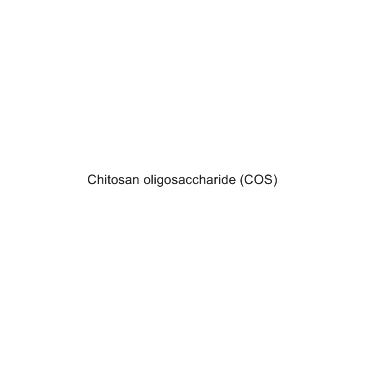Chitosan oligosaccharide COS |
| Catalog No.GC31383 |
Products are for research use only. Not for human use. We do not sell to patients.

Cas No.: 148411-57-8
Sample solution is provided at 25 µL, 10mM.
Chitosan oligosaccharide (COS) is an oligomer of β-(1→4)-linked D-glucosamine. Chitosan oligosaccharide (COS) activates AMPK and inhibits inflammatory signaling pathways including NF-κB and MAPK pathways.
Chitosan oligosaccharide (COS) represents a class of natural polymers that holds therapeutic promise in several diseases due to not only its physiochemical properties including water-solubility and low viscosity but also its favorable pharmacological properties including good pharmacokinetics and safety profiles and diverse beneficial biological activities. Activation of AMPK and inhibition of inflammatory signaling pathways including NF-κB and MAPK pathways are recognized as major mechanisms responsible for several effects of Chitosan oligosaccharide (COS) including anti-inflammation, anti-cancer, and anti-diabetes. COS can interrupt cancer progression at multiple stages by modulating several signaling proteins/pathways including NF-κB, AMPK, mTOR, caspase-3, CD147, MMP-2, MMP-9, and VEGF. In vitro experiments have demonstrated that Chitosan oligosaccharide (COS) induced the death of several cancer cell types including ascites, bladder cancer, prostate cancer, lung cancer, liver cancer, leukemia, cervical cancer and colorectal cancer. The values of IC50 of Chitosan oligosaccharide (COS) in inducing cytotoxicity are 25 μg/mL-50 μg/mL depending on types of cancer cells[1].
The oral administration of Chitosan oligosaccharide (16 mg/kg/day) suppresses the production of the proinflammatory cytokines involved in allergic reactions, i.e., IL-4, IL-13 and TNF-α, in the lung tissues and bronchoalveolar lavage fluid of the mice. Last, an anti-inflammatory effect of Chitosan oligosaccharide (COS) on lymphocyte activation has been documented in a rat model of autoimmune anterior uveitis induced by immunization with bovine melanin-associated antigen[1]. Chitosan oligosaccharide (COS) inhibits UV-induced macroscopic appearance in mice skin. Compared with healthy dorsal skin with smoothness and some shallow wrinkles of hairless mice in normal control group, UV exposure for 10 weeks triggers skin erythema, dry, thickening, sagging and coarse wrinkles, and even leathery appearance and slight flesh-colored lesion in the model mice, the visual score of which is markedly higher than that of the normal control group (p<0.05), indicating that UV induces photoaging in skin surface[2].
[1]. Muanprasat C, et al. Chitosan oligosaccharide: Biological activities and potential therapeutic applications. Pharmacol Ther. 2017 Feb;170:80-97 [2]. Kong SZ, et al. Anti-photoaging effects of chitosan oligosaccharide in ultraviolet-irradiated hairless mouse skin. Exp Gerontol. 2018 Mar;103:27-34.
Average Rating: 5 (Based on Reviews and 7 reference(s) in Google Scholar.)
GLPBIO products are for RESEARCH USE ONLY. Please make sure your review or question is research based.
Required fields are marked with *



















